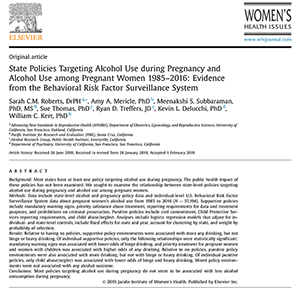 Little evidence exists to determine if state laws targeting alcohol use during pregnancy have their intended effect. This study assessed the relationship between these laws and alcohol use among pregnant women using policy data and individual-level data from the Behaviors Risk Factor Surveillance System. This is the first study to examine multiple alcohol and pregnancy policies across the U.S. and state-level policy environments.
Little evidence exists to determine if state laws targeting alcohol use during pregnancy have their intended effect. This study assessed the relationship between these laws and alcohol use among pregnant women using policy data and individual-level data from the Behaviors Risk Factor Surveillance System. This is the first study to examine multiple alcohol and pregnancy policies across the U.S. and state-level policy environments.
We studied the effect of supportive policies, policies that do not threaten pregnant women with punishment for their behavior, and punitive policies, which use coercion or compel behavior change. Most of these policies are not associated with alcohol use during pregnancy, and those that were associated had effects in different directions. For example, Priority Treatment policies were associated with more self-reports of drinking during pregnancy, while Mandatory Warning Signs and Child Abuse/Neglect policies were associated with less self-reported drinking.
These findings suggest that there are no evidence-based policies that successfully address alcohol use during pregnancy. Assuming that current policies decrease alcohol consumption is not appropriate.
To learn more about the results of this study, “State policies targeting alcohol use during pregnancy and alcohol use among pregnant women 1985-2016: evidence from the Behavioral Risk Factor Surveillance System,” visit the journal Women’s Health Issues.
